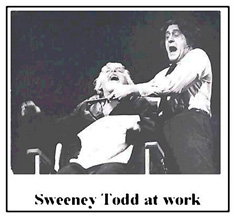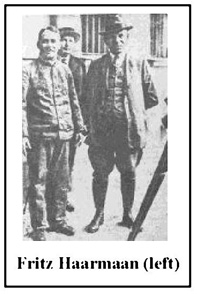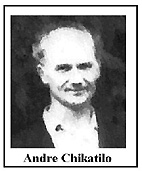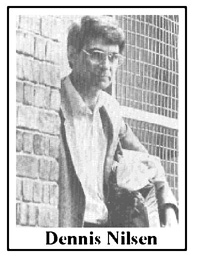|
Jokes about late night kebabs aside, most of us couldn't contemplate
tucking into a human being. But cannibals have always been with us
though their motives vary markedly.
Necessity is perhaps the most understandable motive. Survivors of
plane crashes in remote regions have barbecued the corpses of their
fellow passengers. Sailors cast adrift at sea or explorers lost on an
inhospitable mountainside have done the exact same thing. These men
rationalised that it was pointless dying of hunger when the freshly
dead meat of their companions lay all around.
But other men - and occasionally women - turn to cannibalism for
economic means. Though Sweeney Todd (the  barber
who sold human flesh to the local butcher) was a fictitious character,
there have been butchers who have sold such flesh to their
unsuspecting customers, turning them into unwitting cannibals. One
Chicago-based butcher, Adloph Luetgert, murdered his wife and added
her to his shops popular sausage meat as it was the easiest way he
could think of to dispose of her body. He was sentenced to life
imprisonment in 1899. barber
who sold human flesh to the local butcher) was a fictitious character,
there have been butchers who have sold such flesh to their
unsuspecting customers, turning them into unwitting cannibals. One
Chicago-based butcher, Adloph Luetgert, murdered his wife and added
her to his shops popular sausage meat as it was the easiest way he
could think of to dispose of her body. He was sentenced to life
imprisonment in 1899.
Much more recently, in 1991, a China-based restaurant was convicted
of selling human flesh in the form of dumplings. This particular crime
did not involve killing as the flesh was provided by the
restauranteurs brother who had access to a funeral home.
Sometimes the motive is primarily sexual but the killer also sells
joints of the corpses afterwards for financial gain. One such multiple
lust killer was the Hanover-based Fritz Haarmaan who killed at least
fifty boys between 1918 and 1924. (But like most multiple killers he
was tried for far fewer murders than he committed so he was only
convicted of twenty four such deaths.)
Haarmann, who had had the typical serial killer's violent and
unhappy childhood, would lure the young men to his apartment with
promises of food or drink. There, he had sex with them then attacked
them viciously, sometimes biting through their windpipes or strangling
them to death. Afterwards he cut them into joints of meat which he
sold on the black market. His eager customers were told that they were
buying pork. Haarmann only got caught when he disposed of the
skeletons so carelessly that several skulls were washed up on the
beach within a short space of time. He was executed by decapitation in
1925 at the age of fifty four.
Another killer who combined an economic motive with a sexual one was
a twenty six year old Dutch woman, Anna Zimmermaan. In July 1981 the
separated mother-of-two tired of her lover, drugged him then drowned
him in her bath tub. After carving up his body, she enjoyed it in the
form of roasts and steaks. She admitted this act of cannibalism and
also admitted to murdering and eating her pets, explaining that it
kept down her butcher bills.
Anna Zimmermaan was rumoured to be mad - but there is method behind
many cannibal's supposed madness. For example, Russian serial killer
Andre Chikatilo had a brother who disappeared in childhood and when
little Andre asked what had happened, his parents told him that the
boy had been abducted and subsequently eaten by starving peasants.
This may well have been true as human meat has always been considered
fair game during famine-torn years.
Andre Chikatilo also saw his father arrested and terrorised for his
political beliefs by the Communists - yet when Andre grew up he became
a Communist. If you can't beat them, join them had obviously become
his creed. Again, this isn't so unusual. People who have been badly
frightened by a particular group sometimes go on to join that group or
a remarkably similar organisation. Thus a freed prisoner may become a
prison warden in an effort to lose his feelings of helplessness.
 Chikatilo
also feared the type of cannibals who had killed and eaten his brother
and by 1978 he had given into his own cannibalistic fantasies. During
the next twelve years he raped over fifty boys, girls and women,
cutting out their sexual organs and eating them raw as he gloated over
their still warm corpses in the forest. He also removed the uterus in
some instances and enjoyed chewing its elastic walls. Chikatilo
also feared the type of cannibals who had killed and eaten his brother
and by 1978 he had given into his own cannibalistic fantasies. During
the next twelve years he raped over fifty boys, girls and women,
cutting out their sexual organs and eating them raw as he gloated over
their still warm corpses in the forest. He also removed the uterus in
some instances and enjoyed chewing its elastic walls.
Reading of such acts, it's easy to imagine that they were performed
by a primitive man, but Chikatilo was a literature teacher who had
worked in a boarding school. He was married and had produced two
children who in turn had given him grandchildren. To his neighbours he
was an easy going and smiling man but inside he was both a terrified
child and a sexually-ravenous and insatiable adult beast. Only
torturing and terrorising his victims made him feel truly powerful -
and eating them was like taking a keepsake from the body, something
that would be with him in his body cells.
Chikatilo (who was found guilty and executed) felt no guilt for his
crimes - but Dennis Nilsen who murdered fifteen young men in Britain
for necrophiliac sex, seemed to feel guilty about his alleged
cannibalism rather than about the multicides. It was the only aspect
of the case that he felt awkward about when discussing it with his
biographer.
Nilsen too had had an unhappy childhood as his father was a violent
drunkard who didn't get on with his mother. When Dennis was ten she
remarried and the increasingly isolated boy spent more and more time
on his own. For a few years he'd enjoyed outings with his grandfather
- but being taken to see the man in his coffin seems to have made the
child become obsessed with death and images of death. As a young man
he went on to whiten his own body with talcum powder so that it
resembled a corpse. He'd look in the mirror at this pale spectre,
become sexually aroused and would satisfy himself.
But in time self stimulation was no longer enough and Nilsen began
to befriend young men in bars, take them home to his flat and strangle
them. He then had power over their corpses which he would keep in the
bath or bed for several days. Later he'd cook some of the flesh to
break it down for easier disposal (he was a trained chef) but his
sense of loneliness and need for connection were so strong that he ate
a little of it.
Sentenced to six terms of life imprisonment (he may be freed in
2008) he now commits the heinous crime of writing poetry.
Poetry writing should obviously never be encouraged - but far more
alarming is the public and media's upbeat response to cannibal Issei
Sagawa. A Japanese national with an exceptionally high IQ, he was
studying in France in 1981 and increasingly tormented by cannibalistic
fantasies. That summer he invited a female student to his apartment on
the pretext that he wanted help with learning French.
Issei Sagawa made a clumsy pass at her and when she rebuffed him, he
walked behind her and shot her through the head. He then had
necrophiliac sex before cutting slices from her breasts, buttocks,
lips and thighs, all of which he ate raw and thinly sliced.
He was caught and spent five years in a mental hospital before being
pronounced cured in 1986. Since then he's corresponded at length with
various crime writers and has become a cause celebre as an author and
a restaurant critic. Meanwhile his victim Renee Hartwelt, a helpful
and hard working girl studying for a postgraduate diploma, has almost
been forgotten - and Issei Sagawa has yet to express remorse for her
death.
 
Carol Anne Davis true crime book Women Who
Kill: Profiles Of Female Serial Killers (paperback £6.99) doesn't
contain any stories of cannibalism but Library Journal said that it
was `recommended for all true crime collections' and Mystery Women
described it as `an awesome work.'
|